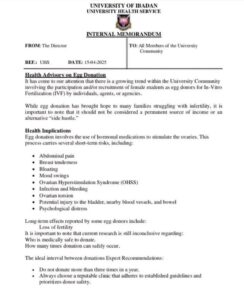
The University of Ibadan (UI) has issued a health advisory warning female students against the rising trend of egg donation being promoted within the university community as a means of income.
In an internal memorandum dated April 15, 2025, and signed by the Director of the University Health Service, the institution expressed concern over the increasing recruitment of female students by individuals, agents, or agencies for egg donation in In-Vitro Fertilization (IVF) procedures.
The memo acknowledged the potential of egg donation in helping families struggling with infertility but emphasized that it should not be treated as a permanent source of income or a casual “side hustle.”
“It is important to note that current research is still inconclusive regarding who is medically safe to donate and how many times donation can safely occur,” the statement read.
The Health Service listed several short-term risks associated with the hormonal stimulation process used during egg donation. These include abdominal pain, bloating, mood swings, ovarian hyperstimulation syndrome (OHSS), infection, ovarian torsion, and psychological distress, among others. Long-term risks such as potential loss of fertility were also highlighted.
Students were advised to exercise caution and follow expert recommendations, which include not donating more than three times a year and always choosing reputable clinics that adhere to established medical guidelines and prioritize donor safety.
The university’s warning comes amid growing concern nationwide about the commercialization of egg donation and its potential implications on young women’s health.

















